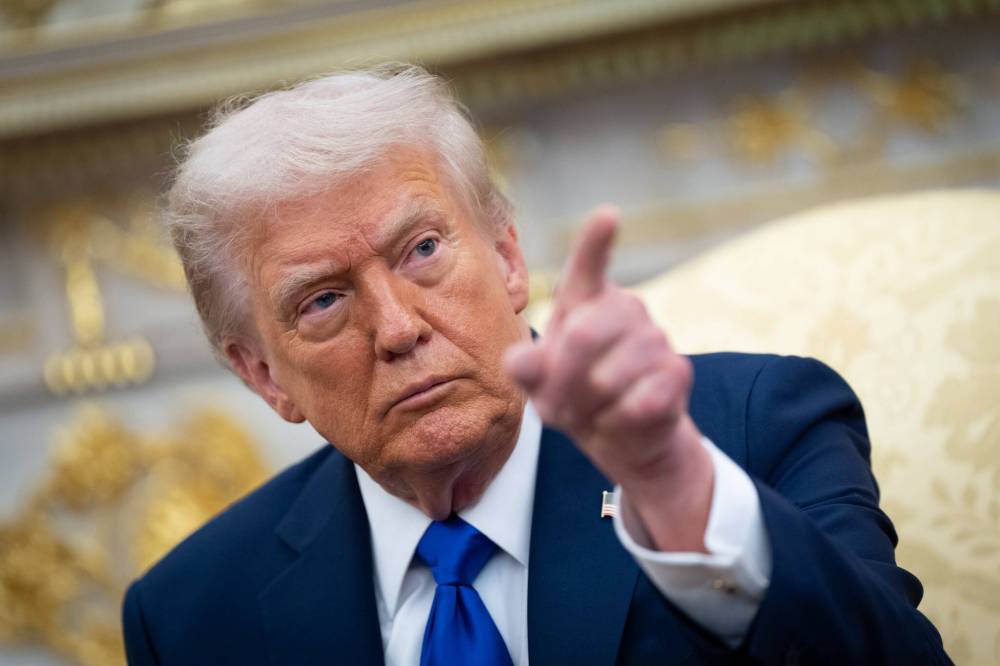Just how far will Donald Trump go?
Advertisement
Read this article for free:
or
Already have an account? Log in here »
To continue reading, please subscribe:
Monthly Digital Subscription
$1 per week for 24 weeks*
- Enjoy unlimited reading on winnipegfreepress.com
- Read the E-Edition, our digital replica newspaper
- Access News Break, our award-winning app
- Play interactive puzzles
*Billed as $4.00 plus GST every four weeks. After 24 weeks, price increases to the regular rate of $19.00 plus GST every four weeks. Offer available to new and qualified returning subscribers only. Cancel any time.
Monthly Digital Subscription
$4.75/week*
- Enjoy unlimited reading on winnipegfreepress.com
- Read the E-Edition, our digital replica newspaper
- Access News Break, our award-winning app
- Play interactive puzzles
*Billed as $19 plus GST every four weeks. Cancel any time.
To continue reading, please subscribe:
Add Free Press access to your Brandon Sun subscription for only an additional
$1 for the first 4 weeks*
*Your next subscription payment will increase by $1.00 and you will be charged $16.99 plus GST for four weeks. After four weeks, your payment will increase to $23.99 plus GST every four weeks.
Read unlimited articles for free today:
or
Already have an account? Log in here »
In a live interview last week with CNN, White House Deputy Chief of Staff Stephen Miller stopped talking in mid-sentence right after he uttered the phrase “plenary authority.”
Miller’s pause was so long, CNN took a commercial break. When the interview resumed, neither Miller nor the CNN host spoke of plenary authority again.
For those who have witnessed U.S. President Donald Trump’s first 10 months in power, Miller’s utterance was hardly shocking. But if asserted, plenary authority — defined as a complete and absolute power — could pave the way for Trump to fully transform the U.S. from a democracy to a country under authoritarian rule.

SARAH L. VOISIN / THE WASHINGTON POST
U.S. President Donald Trump
Trump officials have not formally argued in any court that the president has plenary authority. And yet, its spectre hangs over key legal disputes over the Trump administrations’ ongoing efforts to send in the military to suppress protests against the aggressive deportation of immigrants.
Masked, heavily armed members of the Immigration and Customs Enforcement (ICE) agency have been rounding up people of colour in search of illegal migrants. ICE raids have netted many illegal migrants, but have also ensnared a large number of legal citizens. Given the ICE sweeps’ well-documented, indiscriminate use of force, it is not surprising that protests would erupt.
It is indisputable that most of the protests have been quite tame. When violence has broken out, it is often in response to heavy-handed efforts to disperse the protests. The Trump administration has seized on these clashes as evidence of a “rebellion” requiring the deployment of the National Guard.
The legal issue is whether the president alone has the authority to not only deploy National Guard troops, but to solely determine if the protests represent some form of “rebellion.” To date, federal courts have largely found the White House has failed to back up its claims.
In Chicago, a largely Democrat-leaning city in a Democrat-leaning state, a federal judge said Thursday that she saw “no credible evidence that there is a danger of a rebellion in the state of Illinois.” She issued a temporary restraining order to halt the Trump administrations’ efforts to deploy thousands of National Guard to police the city. A similar decision was rendered in Oregon, where a federal court judge said the Trump administration’s arguments that Portland was “war ravaged” was “untethered to the facts.”
It’s important to note that all lower court decisions are subject to state appeal and review by the Supreme Court of the United States. To date, the White House has relied on military law and the threat of invoking the Insurrection Act to enforce its view that the president, and only the president, can decide what is or is not a rebellion.
This is where plenary authority could become a countrywide legal trump card for the Trump administration.
If the White House can get an opinion from the Supreme Court upholding the notion of presidential plenary authority, it will likely extinguish all of the lower court challenges and restraining orders that have provided some form of check on executive authority. It would make the president utterly above all other laws.
With that kind of power, a false flag rebellion could be used to justify all sorts of authoritarian gestures, from the further militarization of cities, to even more extensive legal punishment of Trump’s so-called “enemies,” the continued undermining of Congress, to possibly a derailment of mid-term or presidential elections.
How far will Trump push to get plenary authority? Watching what has transpired over the past 10 months, we should assume that Trump will take things right up to the very precipice of authoritarian rule in the world’s biggest democracy.





